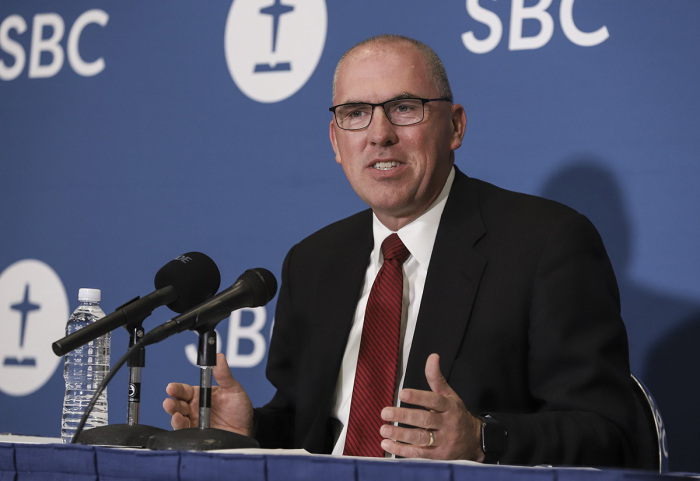Bart Barber: Complementarianism, decentralized polity not to blame for sex abuse crisis in SBC

Newly elected Southern Baptist Convention President Bart Barber has rejected claims that the complementarian theology of the denomination was a major factor in its sex abuse scandal.
At a press conference held Wednesday, Barber gave opening remarks in which he addressed the issue of holding sexual predators within Southern Baptist congregations accountable.
Some have argued that the complementarian theology that is prevalent in the Southern Baptist churches — which, among other things, says that men and women have distinct roles in society and prohibits the ordination of women — has contributed to the SBC’s sex abuse scandal.
Barber rejected this view, stating that “our problem is not with our theology or our polity; indeed these things are among our strengths” and that “it is because we are convinced that our theology is right that we are convinced that our actions have been wrong.”
Barber noted that while “sexual predators have used our decentralized polity to try to turn our churches into a hunting ground,” he also believed that the same decentralized organization of the SBC can be used against predators.
“Where there is no diocesan bishop to fire a local pastor, there is also no diocesan bishop to protect him. Where there is no regional presbytery to defrock a pastor, there is also no presbytery to reassign him while covering up his villainy,” he said.
“Predators have realized the vulnerabilities of our system; it is time for Southern Baptists to realize how nimble and resilient our Baptist polity can be to put sexual predators on notice that Southern Baptist churches are a dangerous place for them.”
During the question and answer segment, The Associated Press asked about how some of the female abuse victims interviewed by Guidepost Solutions for their report had said that “they would have felt better to be able to report this to women in leadership roles.”
Barber responded that within an SBC member church with “true congregational polity,” then any member of the congregation, male or female, can be “a reporting point.”
“And you have female reporting points,” Barber claimed. “In our churches, in these churches where the members come together and their vote is able to determine what the church does, almost all of those churches have more women in them than they do men.”
“We can hold to complementarian theology about the office of pastor and still have a lot of places for people who are not pastors but still have genuine freedom to speak into the life of the church and create reporting points for abuse.”
A reporter for The Houston Chronicle asked Barber his opinion about the presence of right-wing politics in the SBC, citing conservative activist Charlie Kirk speaking at a breakfast event hosted by the Conservative Baptist Network.
Barber replied that while he definitely identified with Reagan Conservatism, he nevertheless said that his faith “informs my politics, rather than my politics informing my faith.”
“I do believe that we have seen some unhealthy ways recently that secular politics have dominated the conversation here in the Southern Baptist Convention,” Barber added.
“Christians need to have opinions about politics, and we need to be engaged in politics. We just need to make sure that in the dance between theology and politics, theology leads.”
In 2019, Southern Baptist Theological Seminary President Albert Mohler Jr. gave a speech in which he looked into the question of whether complementarianism was “a cause of the abuse of women and girls.”
For his part, Mohler concluded at the time that while complementarian theology “can be” and “sometimes is” used by abusive men to justify their mistreatment of women, when complementarianism is properly understood, it “produces husbands who love their wives as Christ loves the church, and they love their wives as they love their own bodies.”
“We’ve received a wake-up call that we be very aware that there are those who will use any doctrine to their sinful advantage,” he continued. “So do I believe that complementarianism leads to the abuse of women? I will tell you that yes, it can and it has, but that’s not the source of the problem.”
“The source of the problem is human sinfulness — pride and arrogance. And yes, there are patterns of male pride and male arrogance and male terror that haunt us.”





























